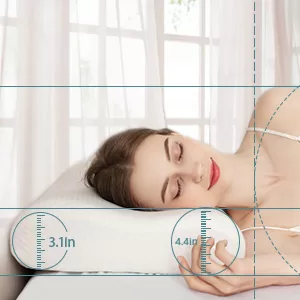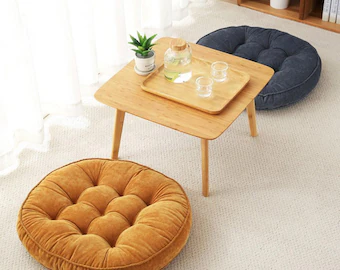Bed Cushions: The 5 Hidden Secret to Your Best Sleep
Upgrade your sleep game with the perfect bed cushion! Experience personalized support, pain relief, and improved sleep quality. Say goodbye to discomfort and hello to your best sleep ever!

- Introduction
- Why Bed Cushions Matter
- The Importance of Support
- Alleviating Pressure Points
- Types of Bed Cushions
- Memory Foam Cushions
- Cooling Gel Cushions
- Orthopedic Cushions
- Choosing the Right Bed Cushion
- Consider Your Sleep Position
- Allergies and Hypoallergenic Options
- Size and Thickness
- The Impact on Sleep Quality
- Enhancing Sleep Comfort
- Addressing Sleep Disorders
- Caring for Your Bed Cushion
- Regular Cleaning
- Pillow Protectors
- Conclusion
- FAQs
Introduction
In the present high speed world, accomplishing a decent night’s rest can frequently appear to be a tricky dream. The demands of daily life, stress, and technology can disrupt our sleep patterns, leaving us feeling groggy and unrefreshed. But what if there was a simple and effective way to improve your sleep quality? Enter the world of bed cushions – the often-overlooked sleep accessory that can be the key to unlocking your best sleep ever.
1. Why Bed Cushions Matter
The Importance of Support
A good night’s sleep begins with proper support, and bed cushions are designed to provide just that. Your spine has a natural curvature, and the right cushion can help maintain that alignment, reducing the risk of back pain and discomfort. By cradling your head and neck, a well-chosen bed cushion can keep your spine in a neutral position, promoting healthier sleep posture.
Alleviating Pressure Points
Do you often wake up with sore shoulders or aching hips? Pressure points caused by inadequate support can lead to discomfort during the night. Bed cushions, especially those made from memory foam, contour to your body’s shape, distributing weight evenly and reducing pressure on sensitive areas. This can lead to a more restful and pain-free sleep experience.
2. Types of Bed Cushions
Memory Foam Cushions
Memory foam cushions have revolutionized the world of sleep accessories. The viscoelastic material answers body heat, permitting it to adjust to the interesting state of your head and neck. This personalized support can help alleviate pain and discomfort, making it a popular choice among sleep enthusiasts.
Cooling Gel Cushions
For those who tend to sleep hot, cooling gel cushions offer a refreshing solution. These cushions are infused with cooling gel particles that dissipate body heat, helping regulate your temperature throughout the night. With a cool and comfortable sleep surface, you can bid farewell to tossing and turning due to overheating.
Orthopedic Cushions
If you suffer from specific sleep issues, such as snoring or sleep apnea, orthopedic cushions may be the answer. These specialized cushions are designed to address particular sleep concerns by promoting better alignment and reducing airway blockage. By targeting the root cause of your sleep troubles, you can enjoy more uninterrupted and revitalizing sleep.
3. Choosing the Right Bed Cushion

Consider Your Sleep Position
We all have our preferred sleep positions, and the right bed cushion can complement them perfectly. Back sleepers may benefit from medium-firm cushions that provide adequate support, while side sleepers may prefer softer cushions to cushion their hips and shoulders. Stomach sleepers, on the other hand, might find thinner cushions more comfortable to prevent straining the neck.
Allergies and Hypoallergenic Options
Allergies can disrupt your sleep and leave you feeling congested. To combat this, consider hypoallergenic bed cushions made from materials that resist dust mites, mold, and other allergens. This can create a cleaner sleep environment and promote better respiratory health.
Size and Thickness
The size and thickness of your bed cushion play a crucial role in your sleep experience. The cushion should complement the size of your mattress and your personal preferences. A cushion that’s too thick might elevate your head too much, while one that’s too thin may not provide enough support.
4. The Impact on Sleep Quality
Enhancing Sleep Comfort
Your sleep environment significantly impacts how well you rest at night. A high-quality bed cushion can provide the comfort and support needed to help you fall asleep faster and stay asleep longer. The better you sleep, the more refreshed and energized you’ll feel in the morning.
Addressing Sleep Disorders
Sleep disorders can severely disrupt your sleep patterns and overall well-being. Certain bed cushions, such as orthopedic options, can address specific sleep issues, like snoring or sleep apnea. By tackling these challenges head-on, you can significantly improve your sleep quality and overall health.
5. Caring for Your Bed Cushion
Regular Cleaning
Keeping your bed cushion clean is essential for maintaining a hygienic sleep environment. Regularly follow the manufacturer’s cleaning instructions to remove dirt, oils, and allergens that can accumulate over time.
Pillow Protectors
Investing in high-quality pillow protectors can extend the life of your bed cushion. These protective covers act as a barrier against stains, dust mites, and other allergens, ensuring that your cushion stays fresh and in pristine condition for longer.
OTHER ARTICLES
Conclusion
Sleep is a precious commodity that directly impacts your physical and mental well-being. Bed cushions are the hidden secret to achieving your best sleep ever. With their ability to provide support, alleviate pressure points, and address sleep issues, they play a crucial role in improving sleep quality.
Now that you’re armed with the knowledge of how bed cushions can positively impact your sleep, it’s time to take action. Upgrade your sleep game and experience the hidden secret to your best sleep by investing in the perfect bed cushion tailored to your needs.
Q: How frequently would it be advisable for me to supplant my bed cushions?
A: It’s recommended to replace your bed cushion every 1-2 years to ensure optimal support and hygiene.
Q: Can bed cushions help with neck pain?
A: Yes, certain bed cushions, like cervical pillows, are designed to provide support and relief for neck pain.
Q: Are memory foam cushions safe for all sleepers?
A: Memory foam cushions are generally safe for most sleepers, but those with allergies should opt for hypoallergenic options.
Q: Can bed cushions improve snoring?
A: Yes, specially designed orthopedic cushions can help reduce snoring by promoting better airflow and alignment.
Q: Are bed cushions suitable for all mattress types?
A: Yes, bed cushions can complement various mattress types, including innerspring, memory foam, and latex mattresses.













